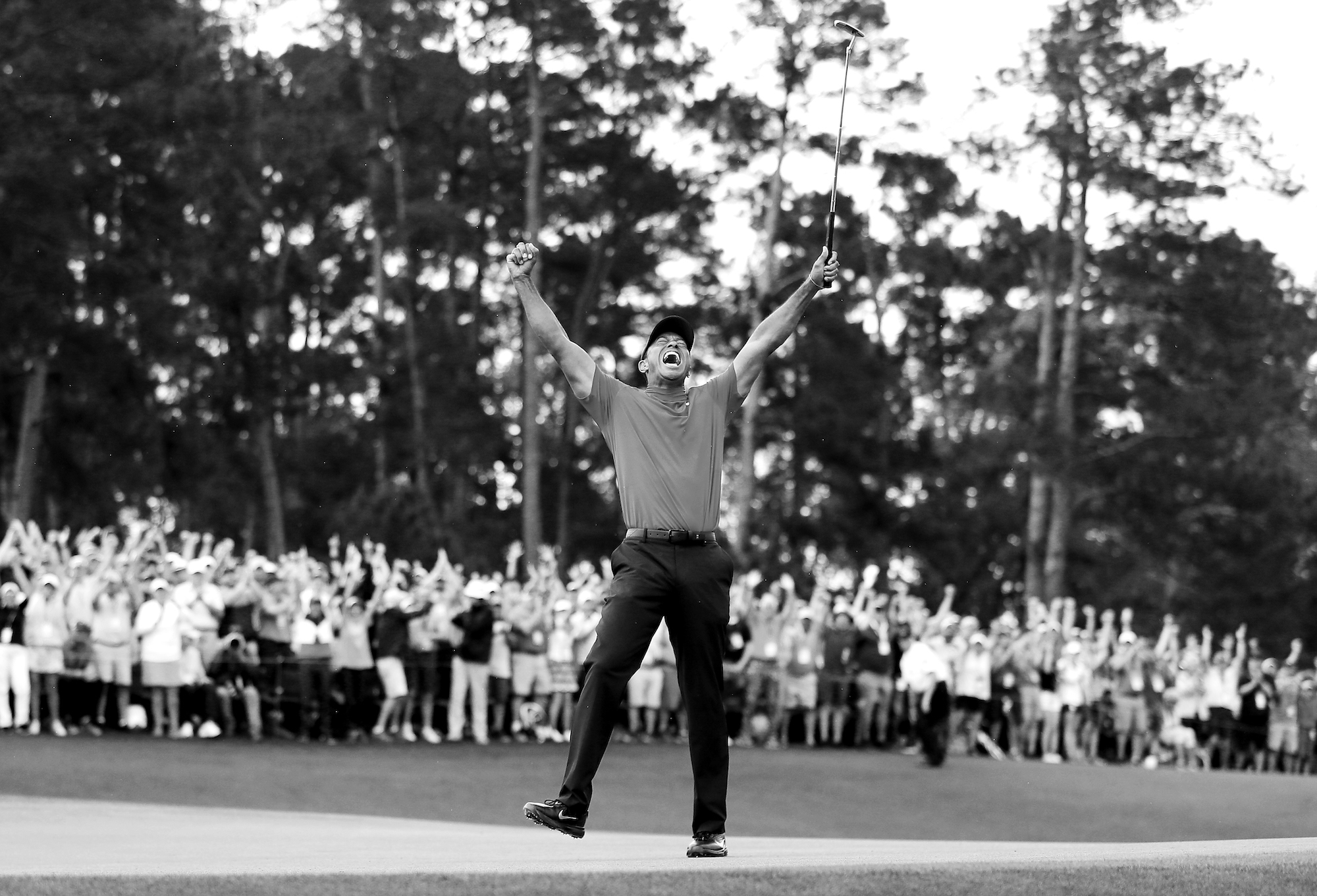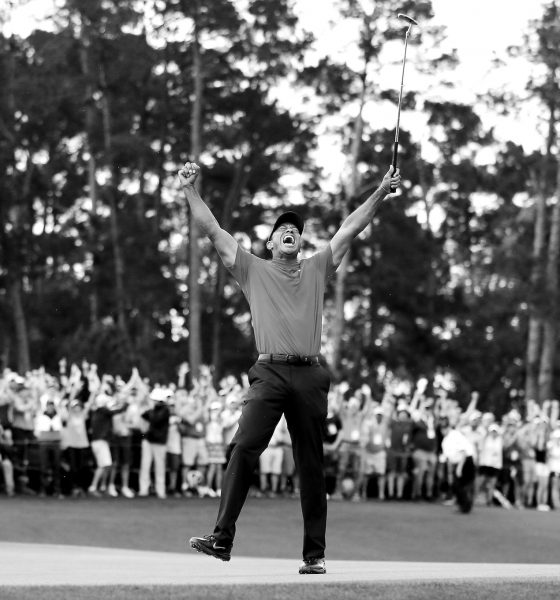

Opinion & Analysis
A decade in the dark, an eternity in the sun: Tiger Woods’ extraordinary self-belief has assured his star will forever burn bright
Tiger Woods stated following his Masters victory on Sunday that the moment hadn’t fully sunk in. A sentiment which I’m sure anyone involved in the sport will echo. It was an exhausting four days, and for Tiger Woods and his fans, of which I am one, an incredible and emotional one, after a great decade of struggle.
The Masters has always been the biggest tournament in the sport in my eyes. Falling many times on Easter weekend, traveling to the west of Ireland for a “family weekend” often turned in to myself staying up late as a kid, gripped to the tiny television and limited coverage on offer, urging Tiger on to win the green jacket.
Wearing a ‘TW’ cap, and nervously waiting until the coverage would begin to check the leaderboard, and then anxiously sitting through the four hours of coverage was a ritual. Woods had me in awe as a kid, transforming the game of golf, into what was a fringe sport at the very best in my generation’s eyes, into compelling viewing.
From 2008 at Torrey Pines, until Augusta National in 2019, I, like every other golf fan, had been waiting for Woods to put every setback behind him and claim that elusive 15th major. On Sunday he completed the greatest comeback that you will ever see in sport, and that achievement is a testament to the man’s unrelenting and unwavering self-belief.
I look back at Thanksgiving Day 2009, and the subsequent squalid fallout, which turned Tiger Woods from being universally loved to a divisive figure. The vitriol he received at that time and over the following months left me confused. After all, Woods was hardly the first sports star to have made mistakes in his personal life.
The standard view of those who then saw Woods as the devil incarnate was that he had manufactured an image of perfection, which had all been phony. Making a case against that claim was difficult, though I gave it my best shot.
There is no doubt that Woods’ personal life being exposed and ridiculed made a considerable impact on the trajectory of his career. From winning six times on the PGA Tour in 2009, Woods sheepishly returned to action in 2010, a shell of his former self. Topping irons, chunking wedges and missing short putts, Woods spent the next two years looking powerless on the golf course, hitting rock bottom at the 2011 WGC-Bridgestone Invitational, a tournament that had always been under his spell, shooting a four day total of 18-over par.
2011 was the first of two periods where Woods would be written off. And those who did so were foolish.
Nick Faldo had been one of the most vocal people in this regard, stating at the time while leaning on his own experiences that Woods would never win again due to the stress and lack of peace of mind he now felt on the golf course.
But the six-time major champion severely underestimated the mental strength which Woods possesses.
A three-win season in 2012 was followed by a five-win season in 2013 and a return to the summit of the game. There was just one issue – none of those wins had been in major championships. Considering Woods’ dominance that year, however, a victory in one of golf’s four biggest tournaments was surely just around the corner.
But approaching the end of that brilliant season, Woods’ back troubles began. The second period where he was to be written off was upon us, and this time those who did so were justified.
Woods would go through four back surgeries. In so much pain that he could barely walk, let alone play golf to a fraction of the level he once could.
As often is the case for those in the position, the knives were out for Woods once again. Colin Cowherd made the extremely odd statement that due to his demise, he would instead take Phil Mickelson’s career over that of the now 15-time major champion. While others such as, Brandel Chamblee, Hank Haney, and Tony Jacklin all took the cheap view that due to Woods skulling chips he now possessed the yips, despite being fully aware of the pain which had taken over Woods’ body.
During this period, it’s well documented that Woods feared he might never play again. Despite this, there was always an absolute belief which Woods possessed; If he could get healthy, then he not only could win again, but he would.
In 2016, Michael Jordan who is a close friend of Woods told ESPN
“The thing is, I love him so much that I can’t tell him ‘You’re not gonna be great again.”
Life is hard at the best of times. Self-doubt is natural, and the fragility of human beings means that often negative words can have a significant adverse effect on the aspirations that we possess. Woods not only faced doubts, criticism and calls to retire from those in the media, but also, if Jordan’s claim that he is a close friend of the man is to be believed, perhaps his inner circle as well.
For Woods to come through all of that, and to win his fifteenth major at Augusta National, is an extraordinary achievement. His self-belief over a decade where he almost entirely lurked in the dark is difficult to fathom. What Woods has now earned through his victory at the 2019 Masters, is almost complete immunity from the doubters and naysayers. He has re-written his storyline in the tale that is life.
Books that were published and documentaries aired covering the rise and fall of the 15-time major champion are now out of date. Woods has assured that his legacy will forever remain and be viewed in a positive light following his victory at the Masters.
The hunt for Jack’s record has intensified and considering Woods continued to believe through a decade of hard knocks that he could reach 18 major victories before he retires, then his confidence of doing so now must be at staggeringly high levels.
If there’s a lesson to be learned over the last 10 years of his career, it’s that you should never rule out Tiger Woods in any way. Woods has never doubted himself, or at least, he never doubted what he could do if he got healthy, and that’s why, after possibly the most tumultuous decade any sportsman has ever experienced, he rose once again on golf’s grandest stage to don the green jacket.
If Tiger Woods says he is going to do something, no matter what people or life throws at him, he will find a way. After witnessing Sunday’s success, you should not find yourself surprised should Woods now not just catch Nicklaus’ major tally, but eclipse that number before he calls it a day on what continues to be a remarkable career and comeback.
Opinion & Analysis
The 2 primary challenges golf equipment companies face

As the editor-in-chief of this website and an observer of the GolfWRX forums and other online golf equipment discourse for over a decade, I’m pretty well attuned to the grunts and grumbles of a significant portion of the golf equipment purchasing spectrum. And before you accuse me of lording above all in some digital ivory tower, I’d like to offer that I worked at golf courses (public and private) for years prior to picking up my pen, so I’m well-versed in the non-degenerate golf equipment consumers out there. I touched (green)grass (retail)!
Complaints about the ills of and related to the OEMs usually follow some version of: Product cycles are too short for real innovation, tour equipment isn’t the same as retail (which is largely not true, by the way), too much is invested in marketing and not enough in R&D, top staffer X hasn’t even put the new driver in play, so it’s obviously not superior to the previous generation, prices are too high, and on and on.
Without digging into the merits of any of these claims, which I believe are mostly red herrings, I’d like to bring into view of our rangefinder what I believe to be the two primary difficulties golf equipment companies face.
One: As Terry Koehler, back when he was the CEO of Ben Hogan, told me at the time of the Ft Worth irons launch, if you can’t regularly hit the golf ball in a coin-sized area in the middle of the face, there’s not a ton that iron technology can do for you. Now, this is less true now with respect to irons than when he said it, and is less and less true by degrees as the clubs get larger (utilities, fairways, hybrids, drivers), but there remains a great deal of golf equipment truth in that statement. Think about it — which is to say, in TL;DR fashion, get lessons from a qualified instructor who will teach you about the fundamentals of repeatable impact and how the golf swing works, not just offer band-aid fixes. If you can’t repeatably deliver the golf club to the golf ball in something resembling the manner it was designed for, how can you expect to be getting the most out of the club — put another way, the maximum value from your investment?
Similarly, game improvement equipment can only improve your game if you game it. In other words, get fit for the clubs you ought to be playing rather than filling the bag with the ones you wish you could hit or used to be able to hit. Of course, don’t do this if you don’t care about performance and just want to hit a forged blade while playing off an 18 handicap. That’s absolutely fine. There were plenty of members in clubs back in the day playing Hogan Apex or Mizuno MP-32 irons who had no business doing so from a ballstriking standpoint, but they enjoyed their look, feel, and complementary qualities to their Gatsby hats and cashmere sweaters. Do what brings you a measure of joy in this maddening game.
Now, the second issue. This is not a plea for non-conforming equipment; rather, it is a statement of fact. USGA/R&A limits on every facet of golf equipment are detrimental to golf equipment manufacturers. Sure, you know this, but do you think about it as it applies to almost every element of equipment? A 500cc driver would be inherently more forgiving than a 460cc, as one with a COR measurement in excess of 0.83. 50-inch shafts. Box grooves. And on and on.
Would fewer regulations be objectively bad for the game? Would this erode its soul? Fortunately, that’s beside the point of this exercise, which is merely to point out the facts. The fact, in this case, is that equipment restrictions and regulations are the slaughterbench of an abundance of innovation in the golf equipment space. Is this for the best? Well, now I’ve asked the question twice and might as well give a partial response, I guess my answer to that would be, “It depends on what type of golf you’re playing and who you’re playing it with.”
For my part, I don’t mind embarrassing myself with vintage blades and persimmons chasing after the quasi-spiritual elevation of a well-struck shot, but that’s just me. Plenty of folks don’t give a damn if their grooves are conforming. Plenty of folks think the folks in Liberty Corner ought to add a prison to the museum for such offences. And those are just a few of the considerations for the amateur game — which doesn’t get inside the gallery ropes of the pro game…
Different strokes in the game of golf, in my humble opinion.
Anyway, I believe equipment company engineers are genuinely trying to build better equipment year over year. The marketing departments are trying to find ways to make this equipment appeal to the broadest segment of the golf market possible. All of this against (1) the backdrop of — at least for now — firm product cycles. And golfers who, with their ~15 average handicap (men), for the most part, are not striping the golf ball like Tiger in his prime and seem to have less and less time year over year to practice and improve. (2) Regulations that massively restrict what they’re able to do…
That’s the landscape as I see it and the real headwinds for golf equipment companies. No doubt, there’s more I haven’t considered, but I think the previous is a better — and better faith — point of departure when formulating any serious commentary on the golf equipment world than some of the more cynical and conspiratorial takes I hear.
Agree? Disagree? Think I’m worthy of an Adam Hadwin-esque security guard tackle? Let me know in the comments.
@golfoncbs The infamous Adam Hadwin tackle ? #golf #fyp #canada #pgatour #adamhadwin ? Ghibli-style nostalgic waltz – MaSssuguMusic
Podcasts
Fore Love of Golf: Introducing a new club concept

Episode #16 brings us Cliff McKinney. Cliff is the founder of Old Charlie Golf Club, a new club, and concept, to be built in the Florida panhandle. The model is quite interesting and aims to make great, private golf more affordable. We hope you enjoy the show!
Opinion & Analysis
On Scottie Scheffler wondering ‘What’s the point of winning?’

Last week, I came across a reel from BBC Sport on Instagram featuring Scottie Scheffler speaking to the media ahead of The Open at Royal Portrush. In it, he shared that he often wonders what the point is of wanting to win tournaments so badly — especially when he knows, deep down, that it doesn’t lead to a truly fulfilling life.
View this post on Instagram
“Is it great to be able to win tournaments and to accomplish the things I have in the game of golf? Yeah, it brings tears to my eyes just to think about it because I’ve literally worked my entire life to be good at this sport,” Scheffler said. “To have that kind of sense of accomplishment, I think, is a pretty cool feeling. To get to live out your dreams is very special, but at the end of the day, I’m not out here to inspire the next generation of golfers. I’m not out here to inspire someone to be the best player in the world, because what’s the point?”
Ironically — or perhaps perfectly — he went on to win the claret jug.
That question — what’s the point of winning? — cuts straight to the heart of the human journey.
As someone who’s spent over two decades in the trenches of professional golf, and in deep study of the mental, emotional, and spiritual dimensions of the game, I see Scottie’s inner conflict as a sign of soul evolution in motion.
I came to golf late. I wasn’t a junior standout or college All-American. At 27, I left a steady corporate job to see if I could be on the PGA Tour starting as a 14-handicap, average-length hitter. Over the years, my journey has been defined less by trophies and more by the relentless effort to navigate the deeply inequitable and gated system of professional golf — an effort that ultimately turned inward and helped me evolve as both a golfer and a person.
One perspective that helped me make sense of this inner dissonance around competition and our culture’s tendency to overvalue winning is the idea of soul evolution.
The University of Virginia’s Division of Perceptual Studies has done extensive research on reincarnation, and Netflix’s Surviving Death (Episode 6) explores the topic, too. Whether you take it literally or metaphorically, the idea that we’re on a long arc of growth — from beginner to sage elder — offers a profound perspective.
If you accept the premise literally, then terms like “young soul” and “old soul” start to hold meaning. However, even if we set the word “soul” aside, it’s easy to see that different levels of life experience produce different worldviews.
Newer souls — or people in earlier stages of their development — may be curious and kind but still lack discernment or depth. There is a naivety, and they don’t yet question as deeply, tending to see things in black and white, partly because certainty feels safer than confronting the unknown.
As we gain more experience, we begin to experiment. We test limits. We chase extreme external goals — sometimes at the expense of health, relationships, or inner peace — still operating from hunger, ambition, and the fragility of the ego.
It’s a necessary stage, but often a turbulent and unfulfilling one.
David Duval fell off the map after reaching World No. 1. Bubba Watson had his own “Is this it?” moment with his caddie, Ted Scott, after winning the Masters.
In Aaron Rodgers: Enigma, reflecting on his 2011 Super Bowl win, Rodgers said:
“Now I’ve accomplished the only thing that I really, really wanted to do in my life. Now what? I was like, ‘Did I aim at the wrong thing? Did I spend too much time thinking about stuff that ultimately doesn’t give you true happiness?’”
Jim Carrey once said, “I think everybody should get rich and famous and do everything they ever dreamed of so they can see that it’s not the answer.”
Eventually, though, something shifts.
We begin to see in shades of gray. Winning, dominating, accumulating—these pursuits lose their shine. The rewards feel more fleeting. Living in a constant state of fight-or-flight makes us feel alive, yes, but not happy and joyful.
Compassion begins to replace ambition. Love, presence, and gratitude become more fulfilling than status, profits, or trophies. We crave balance over burnout. Collaboration over competition. Meaning over metrics.
Interestingly, if we zoom out, we can apply this same model to nations and cultures. Countries, like people, have a collective “soul stage” made up of the individuals within them.
Take the United States, for example. I’d place it as a mid-level soul: highly competitive and deeply driven, but still learning emotional maturity. Still uncomfortable with nuance. Still believing that more is always better. Despite its global wins, the U.S. currently ranks just 23rd in happiness (as of 2025). You might liken it to a gifted teenager—bold, eager, and ambitious, but angsty and still figuring out how to live well and in balance. As much as a parent wants to protect their child, sometimes the child has to make their own mistakes to truly grow.
So when Scottie Scheffler wonders what the point of winning is, I don’t see someone losing strength.
I see someone evolving.
He’s beginning to look beyond the leaderboard. Beyond metrics of success that carry a lower vibration. And yet, in a poetic twist, Scheffler did go on to win The Open. But that only reinforces the point: even at the pinnacle, the question remains. And if more of us in the golf and sports world — and in U.S. culture at large — started asking similar questions, we might discover that the more meaningful trophy isn’t about accumulating or beating others at all costs.
It’s about awakening and evolving to something more than winning could ever promise.




















dixiedoc
Apr 17, 2019 at 5:31 pm
It seems it’s easy for everybody to forget the “bad” Tiger. Self-absorbed, reclusive, antagonistic philandering a*hole. He has always been a great golfer but that is not necessarily the mark of a great man. Maybe his “difficulties” mostly which were self-inflicted, will make him a better person. That remains to be seen. Congratulations to him for winning the Masters and here’s hoping his seeming change is permanent and not a ruse to regain our adoration.
Tom54
Apr 17, 2019 at 4:55 pm
My take on Tigers troubles after his life unraveled in 09 was this….. I believe before his fall from grace,that whenever he was on the course that he pretty much knew 99% of the gallery was completely behind him at all times. After he returned after all the affairs and the apology and all that I really believe he stood over shots wondering to himself “ damn, I wonder if this lady in the gallery thinks I’m a complete low life for what I’ve done” or if he thought everyone was viewing him in a completely different light after the scandal. I believe that it took him a while to get in that comfort zone of being Tiger Woods on the golf course again. After his great win this past weekend, I can safely say that he is definitely Tiger Woods as we’ve all known for over 20 years. A great start to the season of majors. Can’t wait to see who wins the other three.
Mamaaaaa
Apr 17, 2019 at 2:35 am
None of this will change the fact that he’s a horrible dude, no matter how much he apologizes.
The mother of his kids are nowhere to be seen. Nowhere to be heard from. The Mother of his children. Understand?
How confused do you think they are. And what a mess their lives are going to be wrapped up in all the money protection and not being able to be normal because they can’t see their mother, talk to their mother, spend time with their mother.
bj
Apr 17, 2019 at 7:31 am
must kill you that hes winning and will keep winning, on and off the course. people can and do have the ability to change. some take longer than others to mature and learn from mistakes. hes made huge mistakes, but it appears that he may be learning from them, and is taking steps in the right direction learning from them…..and if not all well. BEST DAMN GOLFER ive ever seen.
i cheer for him as a golfer and as a human to get better, and be better, as i do for you….try to be better as a person.
Aleksandra
Apr 16, 2019 at 11:26 pm
Wow!! What an article.
It’s rare to see such passion for a sport and even more passion for a great golfer.
I must admit I’ve definitely had my doubts in Tiger’s return. However you can not keep “The Greatest of all Time” away from his sport.
There are many great golfers, but when I hear golf, Tiger is the first that comes to mind.
Good job Tiger and nice piece Gianni ????
Love your passion. Never let any fool take that from you. ?
Big Ed
Apr 17, 2019 at 5:26 pm
Good article. Why is Tiger the only top golfer’s missteps are constantly brought up. Is he the only one with skeletons in his closet.
Go Tiger with the “Red. Black and Green:
Jay
Apr 16, 2019 at 9:27 pm
Sammy you dont agree?
sammy oliver
Apr 16, 2019 at 8:41 pm
Good Lord man, get a hold of yourself!
A. Commoner
Apr 17, 2019 at 3:24 pm
Concise and precise. Great comment!